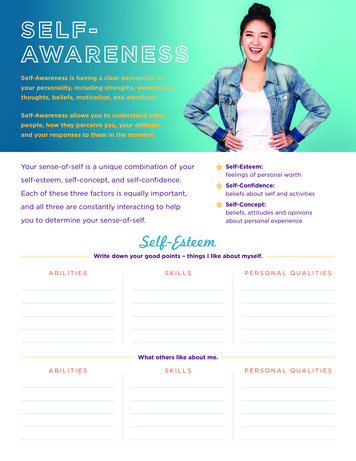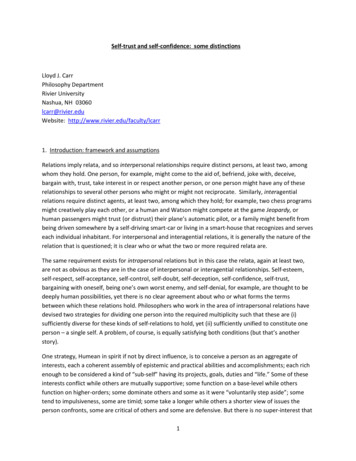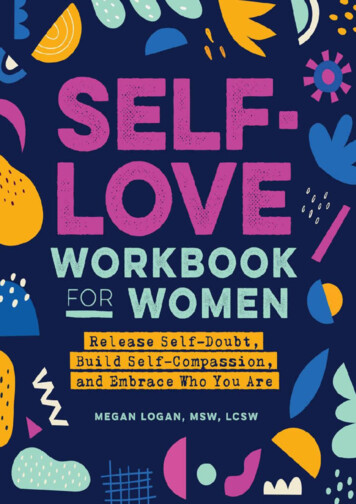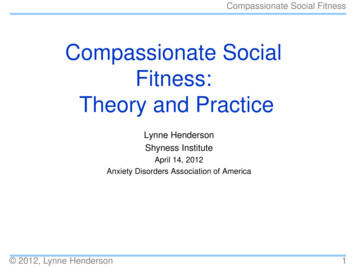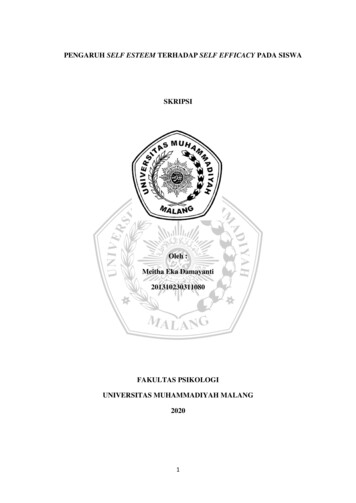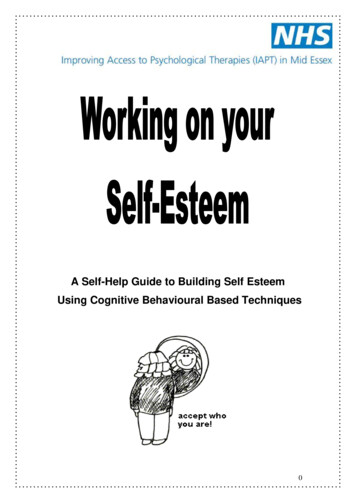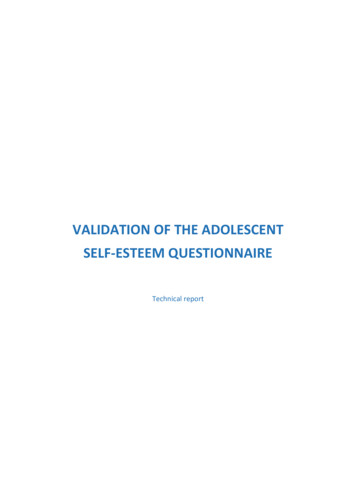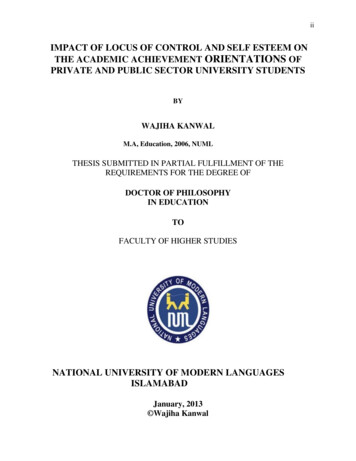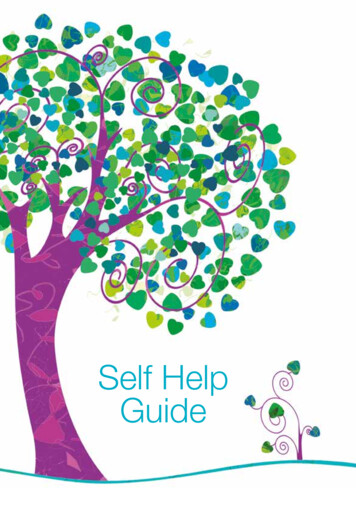
Transcription
Self HelpGuide
ContentsSelf help guide3Introduction4What kind of reactions do people have to trauma?5Why do people have these reactions?7Thoughts8- Your mind reactions8- Some ways you can deal with your thoughtsFeelings1215- Your emotional reactions15- Some ways of dealing with emotional reactions17Grounding step by step18Body19- Your body’s reactions19- Some ways to look after your body19Behaviour22- Your actions23It’s never too late to talk27Key reactions: flashbacks28Key reactions: self-harm30Breaking it down33Further resources352www.sarsas.org.ukHelpline: 0808 801 0456
Self help guideThis self help guide is for survivors of rape or sexual abusewho want to understand and process their own personalreactions to their experience. When you have suffered rapeor sexual abuse it can affect how you think, how you feel,how you behave and how you see the world.The experience of rape can be very different to that of child sexual abuse anddifferent again to other forms of sexual violence. This self help guide is forpeople who have experienced any of these forms of abuse as the reactionsand questions that follow can be similar. It is normal to feel confused, angry,upset, anxious, and a whole range of other emotions. But it does get better.Be gentle and patient with yourself as you go through your feelings andreactions and find ways to feel safer. This takes time.Everyone’s experience is different. Working out which parts of the guide workfor you is a step towards understanding your self and your reactions.In each section of the guide, some commonreactions are explained, followed by someself help suggestions. It can be helpfulto write your own ideas next to oursuggestions or to highlight suggestionsyou particularly like. As you go throughthe guide, try to think about realsituations in which some of theideas might work particularly well.The healthy ways of coping youfind yourself, are always the best.Some additional, information isincluded on a couple of the mostcommon reactions to trauma.These are included after the sectionson the four “parts of yourself”.Email support: support@sarsas.org.uk3
IntroductionHealing is possible after any abuse. It can require courageand patience. Be kind to yourself, and don’t demand toomuch too soon.Many reactions associated with rape and sexual abuse are natural safetymechanisms. Your body and mind are reacting to a dangerous situation: Fear and anger are protective feelings Mistrust and forgetfulness are protective thoughts Isolation and forming extra identities are protective behaviourThese mechanisms may be used long after the immediate danger haspassed. This guide will encourage you to look at these reactions and thinkabout which have been helpful ways to cope then, and which might delayhealing now.Remember: what you are feeling is a normal reactionto an abnormal situation.Choosing to start working on the healing process takes courage. Openingthis booklet is you already starting. Read it at your own pace: take breaks andtry not to overwhelm your self.Remind yourself - It was never your fault- Whatever your reactions, they are normal- Many people don’t tell anybody for many years- Most perpetrators of rape or abuse are known to their victims- You are not alone and there is support available4www.sarsas.org.ukHelpline: 0808 801 0456
What kind of reactions dopeople have to trauma?When a person has experienced a shocking, unexpected ortraumatic incident they are likely to develop deep emotionaland physical shock or stress. These reactions are normaland will be very unique, personal and individual.Email support: support@sarsas.org.uk5
Here are some typical reactions that people can experience after a trauma:Physical Tension in the muscles Tiredness & exhaustion Diarrhoea Little desire to do anything Hyperactivity Dry mouth Sweating Headaches Dizzy spells/funny turns Unsteady breathing Tightness in the chest Increased, rapid heartbeat Other physical painsEmotional Feelings of nxiety Moodiness Panic attacks Nightmares Poor memory Loss in self confidence orconcentrationBehavioural Increased smoking and/ordrinking Over working, or not turning upto work Personal neglect Cutting or other self-harm Nail bitingImpulsivenessTwitches, tapping fingers, etc.Non-stop talkingChanges in eating patternsThis guide will use the word ‘survivors’.It may not feel like it, and you might think you havedifficulty coping, but you have survived and you aresurviving now.6www.sarsas.org.ukHelpline: 0808 801 0456
Why do people havethese reactions?The human brain is rational and intuitive. When you areexposed to danger or traumatic events, the intuitive sidetakes over. It does what it needs to do to survive.Your senses are constantly sending signals to a part of your brain called theamygdala. The amygdala searches through these signals for any threats. If itfinds a threat, it tells your hypothalamus to release defence hormones. Thiswill trigger one of these five instinctive reactions:Fight, Flight, Freeze, (be-)Friend and FlopYour mind will choose the reaction that is most likely to lead to survival andthe least harm. It doesn’t think about how you will feel after. During rape orabuse, the first two options often aren’t possible as they may lead to furtherphysical or mental harm. The last three options are very common as theyexpose the survivor to the least immediate danger.These responses have evolved over thousands of years. Think about how animalspretend they are dead to avoid predators (Flop) or how you may stand still whenyou see a car coming towards you before you think to get out the way (Freeze).This all happens in a split second. A split second later, the amygdala beginsthe slower process of sending the threat signal to the rational part of yourbrain (the cortex or hippocampus). It is a few seconds later that we manageto think rationally about the threat.As the instinct for immediate survival overrides longer-term rational thought,fear can overwhelm rationality during trauma.If there is a safe outcome (survival), the brain learns to use that reaction again.Sometimes, this response can be used repeatedly in less and less riskysituations. This can lead to a heightened state of awareness of risk, or to afeeling of numbness.Email support: support@sarsas.org.uk7
I cannot talkabout itIf only I hadn’t.I’m notcoping.They should haveprotected meNobodyunderstandsI have nocontrol8www.sarsas.org.ukHelpline: 0808 801 0456
ThoughtsYour mind’s reactionsIt can be very hard to stop thinking about the rape orabuse. Trying to understand it can be confusing and canlead you to think things about yourself that aren’t true.Blaming yourself I should have I should not have I deserved it because The person who did that to you madethe choices. You are not to blame. Yourreactions were normal reactions in anabnormal situation, and you survived.Helplessness I cannot go on I’m not coping By being here today you are coping.Concentration difficulties caused by:These are normal reactions when your Sleeplessnessmind is processing trauma. Things will Nightmaresget easier and more manageable. Dissociation ConfusionDifficulty saying what happened I cannot say that word Nobody will believe me Fearful thoughts Fear of what people will say Fear if the abuser is still around Fear of not being believed Cyclical, panicky thoughtsEmail support: support@sarsas.org.ukIt’s normal to find talking about rape orabuse scary. Take your time. Say it inyour own words, in your own way. It’snever too late too talk to someone.Abusers are able to abuse becausethey instil a fear of speaking up in theirvictim.You are safe now and there arepeople who will believe and supportyou if you decide you want to talk.9
Angry thoughts They should haveprotected me No man can be trustedAnger is to be expected aftersomeone betrays your trust or senseof safety. It is healthy, but try andconsider who is really to blame.Self-loathing I’m dirty and disgusting Nobody will ever understand me Nobody will ever love meFeeling different Nobody understands Things will never be the sameYou are much more than whatsomeone did to you. You have hadto cope with something traumatic,and you are still you.Everybody is different. Everythingthat happens to us has the potentialto make us stronger.FlashbacksA flashback is a memory suddenly, unexpectedly and vividly revisited. You feelas though the event is happening all over again-you can see, hear, feel andsmell the same things. It is also an unprocessed memory. See page 28 formuch more detail about flashbacks.The human spirit is stronger than anything that happens to it.The memory. Survivors are often distressed not only by the memory of whathappened, but also how they remember it. The hormones released during theinstinctive responses to trauma (see page 7) can also affect the part of yourbrain that is responsible for memory. It can ‘blow the fuse’ and stop you frombeing able to access memories or associate them with a time or a place. Theparts of the brain which are most active during an experience will decide howthe incident is stored as a memory and how it is accessed later. Sexual abuseand rape are highly traumatic experiences. The memories can be:10www.sarsas.org.ukHelpline: 0808 801 0456
I ntrusive (the memory keeps appearing because it is unfinishedbusiness, and you really wish you could somehow finish the experience) Fragmented (bits and pieces are remembered) Sensory (the pictures, sounds, smells and feelings during a flashbackare so clear that the event is remembered by all of, or a combination ofsome senses) Non-sequential (you can’t remember which event happened first) Non-verbal (it is difficult to put into words) Non-contextual (the main aspects are remembered, but it’s harder toremember where/when etc) Buried (it may not be remembered until years later, it may be revealedin a dreamlike quality, in snapshots, or ultra-vivid such as flashbacks.This may make it difficult to accept)SARSAS has lots of information on memory and there are people researchingthis. Please ask us for more information.Email support: support@sarsas.org.uk11
Some ways that you can deal with your thoughtsBring your thoughts outside. Writing thoughts down shifts themfrom the inside to the outside. Now you can explore them and think aboutwhether they are helpful.Look at triggers. Can you figure out what, when, where and who canset off a flashback or anxious thought? A trigger record will help youto manage or avoid trigger-situations. It will also help you to preparefor them.Think about what’s important to you. Make a list of valuables that keepyou going on the journey of life. It might include: inner resources (e.g. good memories and experiences, previoussuccesses, positive characteristics and strengths, spiritual/religious beliefs) o uter resources (e.g. people who love(d) and believe(d) in you,nature, animals, objects, a safe place, activities, aspirations). list your resourcesDraw an image or make a collage that can help you when you feelgloomy or sad. Put the poster up where it can inspire you.Letters of my name. Write your name in big letters. Describe yourselfby using the letters of your name. Every letter must represent somethingpositive about you (abilities, likes, etc.). For example, Sam might be:Sympathetic, Affectionate and Musical. Make a name-poster or designa name-card.Positive things diary. Note down three positive things that have happenedeach day before you go to bed, eg. I visited my favourite place, I finally didthat pile of washing up, I got through a day without a flashback. Look backthrough this diary when you are feeling sad or can’t sleep.‘What are the words you do not yet have? What do youneed to say? There are so many silences to be broken’Audre Lorde (20th century American writer)12www.sarsas.org.ukHelpline: 0808 801 0456
Find or make your mantra. A mantra is a personalpower statement of hope and possibility. Tell itto yourself daily; use it to inspire or encourageyourself or to quiet negative thoughts. Here aresome examples: T he Metta prayer: “May all beings be peaceful.May all beings be happy. May all beings be safe. Mayall beings awaken to the light of their true nature. May allbeings be free.” “I can do this.” “I am kind to myself.” “ (God) grant me the serenity to accept the things I cannot change, thecourage to change the things I can and the wisdom to know the difference.”My best person. Is there a person that you know (or used to know) whoalways supported and believed you? Keep a photograph or any symbol ofthis person with you always. Refer to it (touch, look at) when you need them.My best person-response. Think about what your best person wouldsay to you if you had an unhelpful thought or experience.What would I say? If someone close to you said the same thing as youwere thinking, what would you say to support her or him?Distractions. Make a list of distractions. Contact a friend Watch a favourite film or TV programme Do something creative Dance Make yourself a safe cocoon in bed with your duvet Visit a place that makes you feel safe (such as a friend or familymember’s house, a park or beauty spot, a museum/gallery, a cafe) Cuddle or play with a pet Do some volunteering (some find it comforting to help people, animalsor the environment during their own healing process)Email support: support@sarsas.org.uk13
Give yourself a calming sleep routine. Loneliness or overthinkingcan become a real challenge when you are ‘inactive’. Keeping anightlight on and listening to the radio or calming music may help.Electronic screens do not help with relaxation. Alcohol will stimulateyou instead of relaxing you due to its sugar levels. Slow your breathing– count in for 4 and out for 7.Don’t blame yourself. If you find yourself thinking ‘Why didn’t I ’,‘It was my fault’, ‘I should have ’, ask yourself: What is the evidence? If someone told me the same story, who would I blame? Are there other ways to think about what happened? What are the positives and negatives of this way of thinking? What logical errors am I making? What would my ‘best person’ say to tell me that it wasn’t my fault? What would an organisation like SARSAS say?If a friend or a family member told you that this hadhappened to them would you blame them? Would you thinkthey should have reacted differently? Would you think ofthem any differently?Try not to let the benefits of hindsight allow you to treatyourself cruelly. You have survived and you are healing.‘Be attentive to what is arising within you, and placethat above everything else . What is happening in yourinnermost self is worthy of your entire love: somehow youmust find a way to work at it.’Rainer Maria Rilke (20th Century German Poet)14www.sarsas.org.ukHelpline: 0808 801 0456
FeelingsYour emotional reactionsWhen dealing with trauma, you can feel: a huge mass of feelings that are difficult to separate, or a nothingnessSurvivors sometimes feel overwhelmed by many different feelings. They mightfeel them in their throat, or their tummy, or somewhere else. They may beexperienced as a mass of feelings that are hard to describe.When you look at this huge block of feelings, you will notice some individualones. Often it is helpful to explore these feelings, identify each one, andinvestigate what the thought behind it is.Begin to look at your feelings individually and explore them:Anger is not the enemy. Anger can show you that what is important to youis under threat. Anger protects you from future betrayal. It warns you that youmust do something about the reason behind it. The WAY a person chooses todeal with anger can sometimes be a problem, but not the feeling itself.Shame is one of the most destructive emotions. People usually feel shamebecause they feel they are not good enough or that something is wrong with them.Sadly, shame can make the survivor fear talking to people who could be supportive,and who could help them see that they do not deserve to feel ashamed.Loneliness. Many survivors feel they are unable to trust anyone. They mightbe afraid of sharing their experiences with others, and they might feel asthough they are alone and that no-one could understand how they feel or whatthey went through.Emptiness. The feelings are sometimes so overwhelming that - in order to cope- a survivor buries them all. These are called dissociated emotions. You mayworry that other people will blame you, or you may have been told it was yourfault. This is absolutely not true. Sexual abuse is always the fault of the abuser.There are people who understand these feelings and wantto support you.Email support: support@sarsas.org.uk15
16www.sarsas.org.ukHelpline: 0808 801 0456
Some ways of dealing with emotional reactionsSet yourself small and manageable targets: Manage the levels of your feelings by grounding them with an object(see page 18) Express your feelings in a safe environment Identify and name each one of your feelings Try to let them out in the open, write or talk about them Accept that your feelings are allowed, and are normal. Each of themhas a cause. Each of them belongs to you Sort them as belonging to either the past or to the present Look at the thought that is behind each feelingListen in and out. Close your eyes and identify the furthest sound you canhear. After 30 seconds bring your listening in and listen to and identify theclosest sound you can hear. This may include sounds from your own bodylike your breathing or your heartbeat. Repeat.Take your feelings outside yourself. You can draw a map of your feelingswith a colour representing each feeling. Think about the size of your feeling,and give it a similar amount of room on the paper. Think about the thoughtsbehind the biggest feelings and where they’ve come from.Use alone time to learn or practise a skill or hobby. If you don’t feelready or aren’t always in the right mood to be around others, filling your timewith hobbies can help ease feelings of loneliness. For example, learning alanguage, a craft or a musical skill are hobbies that can be practised alone.YouTube videos can be good for this.Use power-quotes. Collect power-quotations. Display them. Create a poster.Read them aloud. Think about them. Believe them.Try counselling or face-to-face support. This can be a good way of helpingto express and process feelings such as anxiety, fear, anger, depression, guilt,shame and low self-worth. Learning to share your feelings and experienceswith a trained professional or non-judgmental trusted person can help you tofeel understood and supported, and to accept and value yourself.Email support: support@sarsas.org.uk17
GroundingGuidelines1. Grounding can be done anywhere, any place or any time and no oneneeds to know you are doing it. 2. Use grounding when you are experiencing a trigger, when you feelstrong emotions, feel like using substances, harming yourselfor feel yourself dissociating.3. You can rate your mood before and after, on a 0-10 scale.4. Keep your eyes open to stay in touch with the present.5. Stop yourself from talking about negative feelings at this stage, you wantto distract away from this.6. Focus on the here and now, not the past or future.7. Grounding is more than just a relaxation strategy, it is used to distract andhelp extreme negative feelings. It is believed to be more effective fortrauma than relaxation alone.How to do itMental Grounding1. Have a good look around and describe your environment in detail,e.g. ‘I am on the train, I can see trees and a river .’2. Mental games, e.g. go through the alphabet thinking of different thingssuch as types of dogs, cities etc.3. Age progression, if you have regressed you can slowly go back up eg:I am now 9, 10 etc. until you are back up to your current age.4. Describe an everyday activity in detail, such as how to make a recipe.5. Imagery, for example imagining a stop sign in your head, gliding on skatesaway from the pain, changing the ‘TV channel’ in your head to a better ‘show’ or imagining a wall as a buffer between you and the pain.6. Safety statements, thinking ‘I am safe now, I am in the present not thepast, I am in this location and the date is .7. Use humour, think of something funny.8. Use concentration, say the alphabet backwards or practise sometricky sums.18www.sarsas.org.ukHelpline: 0808 801 0456
Physical Grounding1. Run warm or cool water over your hands.2. Focus on your breathing, notice each inhale and exhale, slow it down andrepeat the word safe on each inhale.3. Grab tightly onto your chair as hard as you can.4. Touch different objects, your pen, your keys etc.5. Dig your heels into the floor; remind yourself that you are connected tothe ground.6. Carry a grounding object in your pocket, a small rock etc. in your pocketthat you can touch whenever you feel triggered.7. Stretching, extend your arms fingers or legs as far as you can.8. Clench and release your fists.Soothing Grounding1. Say kind statements to yourself, e.g you will get through this etc.2. Picture people you care about, look at photos of them.3. Think of a safe place, it could be real or imagined, for example the beach,mountains etc.4. Say coping statement such as I can handle this, I have done it before etc.5. Plan a safe treat such as a nice dinner, bubble bath etc.6. Think of things you are looking forward to, like seeing a close friend.What if grounding doesn’t workPeople who have used grounding say it does work but requires practise tomake it as effective as possible. The more you practise it the better it will work,so try to do some every day, it will become automatic after a while. You don’thave to use the methods listed above, you could think up your own method,you may find that it works better for you. Try to start grounding as early aspossible in a negative mood cycle, for example just after a flash back, don’tleave it until later. You could create a recording of a grounding message thatyou can play whenever you need it, if you don’t want to use your own voiceyou could ask someone close to you to help. You can also teach family andfriends about grounding so they can help if you become overwhelmed. Noticewhich method works best for you, you can use the mood rating scale for this,and lastly, don’t give up!Email support: support@sarsas.org.uk19
BodyYour body’s reactionsOur bodies can hold the trauma from rape or sexual abuse. Every survivorresponds differently to what happened to them.1. Look at your body’s unique responses, and any responses that othershave also had2. Recognise which bodily reactions are related to the abuse, and why yourbody decided to react in that way3. Think/talk about if these reactions are helpful or not right now4. Decide whether you are going to deal with the bodily reaction(s).Some common bodily reactions to rape or abuse are: Irritable Bowel Syndrome Pains Tensions Headaches Changes in body languageBecoming aware of changes and patterns in any bodily reactions are a goodfirst step towards controlling them.Don’t expect too much of yourself at once. There are many different ways to workon your body – anything from yoga to massage to strengthening exercises. If youfeel something isn’t working for you, review it and try a different approach.Some ways to look after your bodyA stronger body can help you deal with your system being overactive.Where in your body do you feel the most pain? Is there anything you cando to soothe it, either with the aid of medicine, advice from a healthcareprofessional (for example your GP, NHS Direct, a walk-in clinic), or thingsyou can do at home?20www.sarsas.org.ukHelpline: 0808 801 0456
If you are not comfortable seeing a male doctor you have the right torequest a female doctor. Also you can refuse any examinations you areuncomfortable with. All professionals should ask your permission to examineyou or touch you.THNGStrength training. Beingstronger helps us feel morein control of our bodies ease positivechemicals throughexercise. Frequent andregular physical exerciseboosts the immune system,improves mental health,helps prevent depression,and encourages positiveself-esteem. Exercise isalso good for sleep.STRESome ways you can soothe your body:EASES ENDORPHINGive yourself time to mend: sleep. Turning your computer, TV or tablet off45 minutes before sleeping helps to relax the mind and prepare it for sleep.Laughter. Watch a favourite comedy. Laughter releases endorphins, whichare our body’s natural painkillers. When you laugh your whole body relaxes.Think about how you could cut down on alcohol, caffeine, sugar orcigarettes. These things can make you feel good for a short time and findingthings that make you feel good is healthy and normal. Identifying things thatmight make us feel worse in the long run and reducing them can be good foryour body and mind.Relaxation techniques may not always help with post traumatic stressdisorder. If trying to relax is making you more anxious; you could try exercisethat helps you release energy and build strength.Email support: support@sarsas.org.uk21
22www.sarsas.org.ukHelpline: 0808 801 0456
BehaviourYour actionsWhen someone has suffered any kind of rape or abuse it can affect theirbehaviour. There are very good reasons for a survivor to behave in certainways. There will always be some thoughts or feelings behind our behaviour:Self-protective thoughts or feelings behind your behaviour: Fear that this secret, which is often or always on their mind,might slip out Thoughts that others may reject them Fear of being questioned A feeling that they can trust nobody Trying to control anxiety or exposure to triggers Trying to block out memories Trying to ‘keep the box shut’ by distracting themselves Fear of seeing the abuser somewhere Fear of having an anxiety attack in front of othersIn order to change your behaviours, you will need to believe it is importantenough to make that change, and have confidence in your ability to makethe change. Identifying the thoughts and feelings behind the behaviour willhelp you to understand and work on your reactions as a whole. Some ofthese thoughts and feelings can help survivors to cope and to process whathas happened safely. Others may cause the survivor further distress orbe harmful. Write down some of the behaviours that you find yourself doing. Ask yourself what the reasons behind those behaviours are Think about how they, and the behaviours they are causing, are makingyou feel in the short and long-term. Evaluate them; are they helpful or unhelpful?Email support: support@sarsas.org.uk23
Pushing people away When I push people away I feel more in control but more alone.Pushing people away can be an instinctive way to protect yourself fromfurther harm. Isolation can often reflect how a survivor acted during or afterrape or abuse. The perpetrator might have forced you to keep it a secret bymaking threats or telling you its normal or that nobody will believe you. It’snormal to be cautious to trust people again. Finding other people to talk tocan help you to think about your own thoughts and reactions. Others can tellyou when your thoughts are unhelpful or self-destructive, and can help you tosee that what happened wasn’t your fault.Not wanting to be intimate How will I ever trust anyone again? I feel like my body isn’t my own.A lot of people fear intimacy after rape or abuse. Take your time, do things as youare ready. What happened to you was not sex. Sex is different because you are incontrol. It’s important your partner understands and allows you to take it at yourown pace.Hyper-sexuality I want to have control back over my body. Sometimes, Idon’t feel how I expected to afterwards.Some people find that they want to have lots of sex,sometimes with lots of different people. This can be a way totake back control of your body. Sex is a healthy and naturalthing, but be aware of if you are putting yourself in somerisky situations. Make sure you are safe and think about how itmakes you feel.Being very vigilant I am constantly on edge.Feeling over-attentive and alert to everysound and movement is normal after traumabecause in that way you protect yourselfagainst danger. As you work through thefeelings and thoughts behind this vigilance, itwill become easier.24www.sarsas.org.ukHelpline: 0808 801 0456
In the short-term, try to find a safe place that is able tosoothe you and go there once a day.Not wanting to go out I don’t want to see him, or anyone else. I don’t have theenergy to go out anyway.Your home can be a therapeutic place where you mayfeel your safest. In the short-term, it might enable youto get through the day. Try to think about what you arecompromising in the long-term. Are there any otherways of achieving these things in small, manageableand safe ways?Drinking / smoking more It makes me calmer, helps me to be sociable.These are normal coping mechanisms in any stressful situation. In whatsituations are you drinking or smoking? How do you feel before andafterwards? Is it leading to any risky or challenging situations?Being more irritable I keep snapping at people. It’s not their fault and I’m pushing them away.Everybody is irritable sometimes. Extreme irritability can come as a result ofa lack of sleep, feelings of isolation or lack of control amongst other things.At what times of the day are you irritable?Reaching out to others, however difficult, can be really helpfulIsolation and secrecy often reflect how a survivor acted during or after rape orabuse. You might have never told anybody for fear of what they might thinkor say or fear of not being believed. Being with others can distract you andcomfort you.Finding other people to talk to can help you to
2 www.sarsas.org.uk Helpline: 0808 801 0456 Contents Self help guide 3 Introduction 4 What kind of reactions do people have to trauma? 5 Why do people have these reactions? 7 Thoughts 8 - Your mind reactions 8
